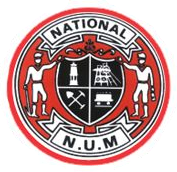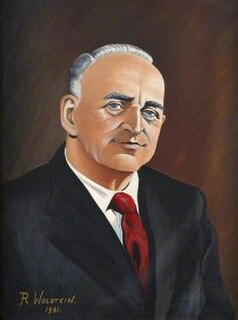Related Research Articles
The miners' strike of 1984-85 was a major industrial action to shut down the British coal industry in an attempt to prevent colliery closures. It was led by Arthur Scargill of the National Union of Mineworkers (NUM) against the National Coal Board (NCB), a government agency. Opposition to the strike was led by the Conservative government of Prime Minister Margaret Thatcher, who wanted to reduce the power of the trade unions.

The Scottish Trades Union Congress (STUC) is the national trade union centre in Scotland. With 40 affiliated unions as of 2020, the STUC represents over 540,000 trade unionists.

The Transport and General Workers' Union was one of the largest general trade unions in the United Kingdom and Ireland – where it was known as the Amalgamated Transport and General Workers' Union (ATGWU) to differentiate itself from the Irish Transport and General Workers' Union – with 900,000 members. It was founded in 1922 and Ernest Bevin served as its first general secretary.

The National Union of Mineworkers (NUM) is a trade union for coal miners in Great Britain, formed in 1945 from the Miners' Federation of Great Britain (MFGB). The NUM took part in three national miners' strikes, in 1972, 1974 and 1984–85. After the 1984–85 strike and the subsequent closure of most of Britain's coal mines, it became a much smaller union. It had around 170,000 members when Arthur Scargill became leader in 1981, a figure which had fallen in 2015 to an active membership of around 100.
The Union of Democratic Mineworkers (UDM) is a British trade union for coal miners based in Nottinghamshire, England. Established in 1985 after a constitutional crisis in the National Union of Mineworkers, the UDM was given its certification on 6 December 1985, although it had effectively been in existence since the Nottinghamshire area of the NUM voted to secede from the federal union on 6 July 1985. After the events of the strike in 1984-5, the Nottinghamshire area of the NUM was involved in a number of disputes with the National Executive Committee that led to a ballot in May on empowering the Nottingham Area Committee to disassociate from the NUM. In ballots on 18 and 19 October on joining with Nottinghamshire in a new union, the South Derbyshire area of the NUM voted in favour by 51% and the Colliery Workers and Allied Trades Association voted in favour by almost 100%.
The Miners' Federation of Great Britain (MFGB) was established after a meeting of local mining trade unions in Newport, Wales in 1888. The federation was formed to represent and co-ordinate the affairs of local and regional miners' unions in England, Scotland and Wales whose associations remained largely autonomous. At its peak, the federation represented nearly one million workers. It was reorganised into the National Union of Mineworkers in 1945.

The General Federation of Trade Unions (GFTU) is a national trade union centre in the United Kingdom. It has 35 affiliates with a membership of just over 214,000 and describes itself as the "federation for specialist unions".

The National Association of Colliery Overmen, Deputies and Shotfirers (NACODS) is an organisation representing former colliery deputies and under-officials in the coal industry.
The Lancashire and Cheshire Miners' Federation (LCMF) was a trade union that operated on the Lancashire Coalfield in North West England from 1881 until it became the Lancashire area of the National Union of Mineworkers in 1945.
Sir Sidney Ford, MBE was a British trade union leader.
The North Wales Miners' Association was a trade union representing coal miners in Wales.

Abraham Moffat was a Scottish trade unionist and communist activist. He was elected repeatedly to high office in the trade unions and represented the union on government coal boards. He held major union offices: President of the National Union of Scottish Mine Workers; member of the Executive Committee of the Miners' Federation of Great Britain; Vice-Chairman Scottish Regional Coal Board; and member National Coal Board. He served as president of the union from 1942 to his retirement in 1961, when he was succeeded by his younger brother Alex Moffat, also an activist.
The UK miners' strike of 1969 was an unofficial strike that involved 140 of the 307 collieries owned by the National Coal Board, including all collieries in the Yorkshire area. The strike began on 13 October 1969 and lasted for roughly two weeks, with some pits returning to work before others. The NCB lost £15 million and 2.5 million tonnes of coal as a result of the strike.

The National Union of Cokemen and By-product Workers was a trade union representing workers involved in turning coal into coke at collieries in Great Britain. It survives today as the Cokemen's Area of the National Union of Mineworkers.
The General Council of the Trades Union Congress is an elected body which is responsible for carrying out the policies agreed at the annual British Trade Union Congresses (TUC).
The history of trade unions in the United Kingdom covers British trade union organisation, activity, ideas, politics, and impact, from the early 19th century to the present.
The National Coal Board Labour Staff Association (LSA) was a trade union representing workers at the National Coal Board in the United Kingdom.
The Lancashire, Cheshire and North Wales Colliery Enginemen's, Boilermen's and Brakesmen's Federation was a trade union representing engine operators and related workers at coal mines in parts of England and Wales.
Jim Hammond was a British trade union leader and communist activist.
References
- 1 2 "Thomas Halstead". Bolton's Mayors. Bolton Metropolitan District Council. Retrieved 21 March 2019.
- 1 2 Smethurst, John B.; Carter, Peter (June 2009). Historical Directory of Trade Unions. 6. Farnham: Ashgate Publishing. pp. 532–536. ISBN 9780754666837. LCCN 80-151653.
- ↑ "Safety in coal mines: colliery officials' views". The Science & Art of Mining. 19 December 1936. Retrieved 21 March 2019.
- ↑ "Colliery Officials and Staff Area (N.U.M Clerical Section)". Archives Hub. Jisc. Retrieved 21 March 2019.
- ↑ Allen, V. L. (1981). The Militancy of British Miners. Shipley: The Moor Press. p. 268. ISBN 0907698018.
- ↑ "Annual Return for a Trade Union: National Union of Mineworkers (Colliery Officials and Staffs Area): 2017" (PDF). Trade Union Certification Officer. UK Government. Retrieved 21 March 2019.